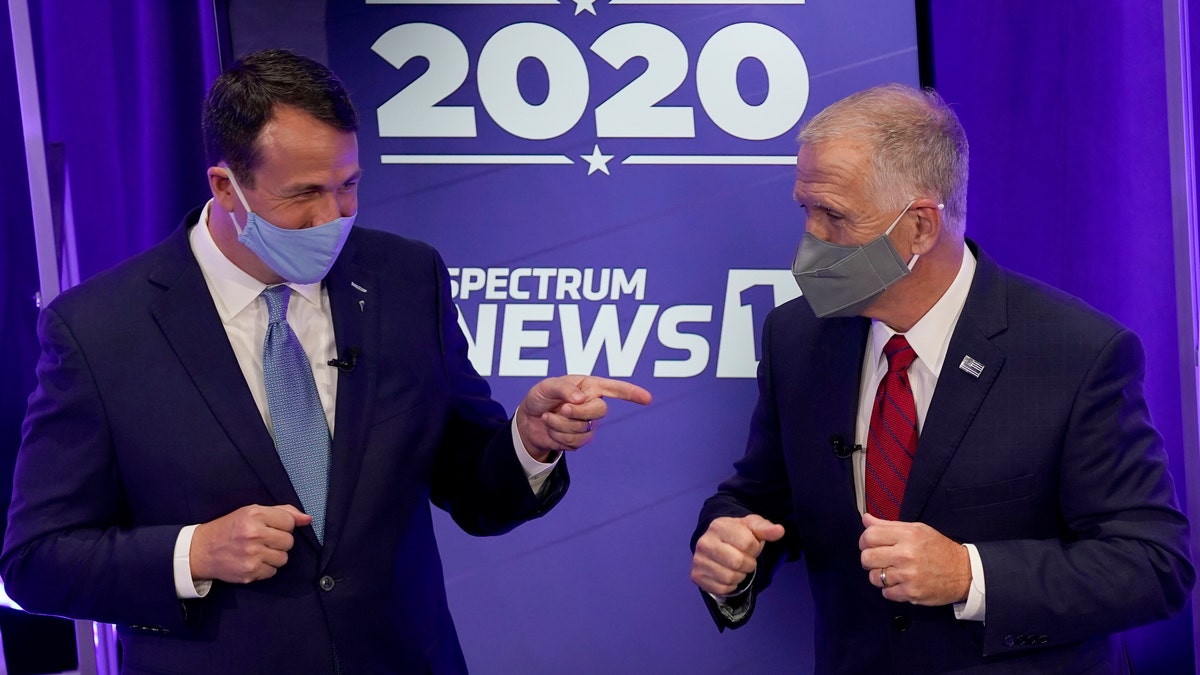Republicans, on defense in 12 states, pulled off a series of high-profile wins in Maine, South Carolina and Iowa that have put them in a good position to retain control of the Senate -- though Democrats still have a narrow pathway for power that will depend on two Senate races in Georgia.
"We had a very good [Election] Day," Senate Majority Leader Mitch McConnell said Friday. "Most pundits thought we were going to lose the Senate. But we have not yet actually secured the majority. That will be determined in Georgia where we will have two-runoffs."
The two senate races in Georgia are headed for run-off elections on Jan. 5 because it appears none of the candidates received above 50 percent of the vote. Democrats will likely need to win both of them to retake the majority for the first time since 2014.
The balance of power in the Senate has not been called by the Fox News Decision Desk as of Friday afternoon.

FILE - In this Oct. 28, 2020, file photo, Senate Majority Leader Mitch McConnell, R-Ky., speaks to supporters in Lawrenceburg, Ky. (AP Photo/Timothy D. Easley, File)
Democrats, who had just two incumbents in jeopardy, so far have a net gain of one seat in the Senate. They flipped seats in Colorado and Arizona but lost Democratic incumbent Sen. Doug Jones in Alabama, according to Fox News Decision Desk race calls.
That puts the balance of power at 48 for Democrats and 48 for Republicans, so far.
CLICK HERE FOR SENATE RACE RESULTS
Four races with Republican incumbents remain undecided in Alaska, North Carolina, and two seats are still undecided in Georgia. Republicans are holding the lead in Alaska and North Carolina, which would bring their numbers up to 50-48 if successful.
Then all attention will be on the two remaining races in Georgia, which will be decided two months from now and after the next Congress is sworn in.
Republicans would need to win just one race in Georgia to secure the majority. But if Democrats win them both, they'd secure 50 seats in the Senate. Assuming Joe Biden wins the White House, then Kamala Harris would serve as the tie-breaking 51st vote in the Senate to give Democrats the edge.
Here's a look at where the state of the Senate stands as of 1 p.m. Nov. 6.
Undecided races
Georgia
Control of the Senate looks like it will hinge on Georgia in January 2021. The special election to decide who serves the remainder of former Sen. Johnny Isakson's term is headed to a run-off on Jan. 5 between Democrat Raphael Warnock and GOP Sen. Kelly Loeffler, who was appointed to the seat after Isakson's resignation for health reasons.

Kelly Loeffler (R) and Raphael Warnock (D) advance to a run-off election for Georgia's senate.
Both sides are also bracing for the second race to require a run-off between Republican Sen. David Perdue and Democrat Jon Ossoff. If one candidate secures over 50 percent, he'll win outright. If not, a rematch between Perdue and Ossoff would take place on Jan. 5, 2021, without the Libertarian candidate Shane Hazel on the ballot.
Sen. David Perdue (R) vs. Jon Ossoff (D)
In the final days of the contentious election, Perdue canceled the debate with Ossoff to attend President Trump’s campaign rally in Georgia. Ossoff was hammering Perdue on his health care voting record. During their last debate, Ossoff labeled Perdue a “crook” who has been accused of insider trading, while Perdue claimed Ossoff has problematic ties to a Hong Kong-based media company.
Under Georgia law, if one candidate secures over 50 percent, he'll win outright. If not, a rematch between Perdue and Ossoff would take place on Jan. 5, 2021, without the Libertarian candidate Shane Hazel on the ballot.
Votes are still being counted but both sides are planning for the race to continue into overtime.
With 98 percent of the vote in, Perdue was at 49.84% and Ossoff at 47.85%
Sen. Kelly Loeffler (R) vs. Raphael Warnock (D)
Loeffler, the wealthiest U.S. senator, is looking to retain the seat she inherited after Sen. Johnny Isakson resigned in 2019 for health reasons. In a 20-person special election, Loeffler defeated her biggest GOP challenger, Rep. Doug Collins, to advance to the run-off election. She secured 26% of the vote to Collins' 20%.
Democrat Raphael Warnock, a pastor and civil rights leader, led the crowded field with 33% of the vote with 98 percent of the ballots counted.
LOEFFLER, WARNOCK HEADED TO RUNOFF IN GEORGIA AS COLLINS CONCEDES
As the top-two finishers, Loeffler and Warnock will now face-off on Jan. 5.

Democratic challenger Cal Cunningham, left, and U.S. Sen. Thom Tillis, R-N.C. greet each other after a televised debate Thursday, Oct. 1, 2020 in Raleigh, N.C. (AP Photo/Gerry Broome, Pool)
North Carolina
Sen. Thom Tillis (R) vs. Cal Cunningham (D)
The swing state is too close to call for either the presidential election or the Senate.
Tillis, a first-term senator, had trailed Cunningham in polls throughout the race. However, Republicans seized on a sex scandal involving Cunningham and the wife of a military veteran and argued that he is unfit for office.
Tillis quickly claimed victory, but Senate Majority Leader Mitch McConnell said afterward it was too early to call the race but remained optimistic Tillis would prevail when the votes were counted.
With 93 percent of the vote in, Tillis was ahead 49%-47%.
Alaska
Sen. Dan Sullivan (R) vs. Al Gross (I)
Sullivan, a first-term senator, appears to be fending off a challenge from orthopedic surgeon Al Gross, an independent who is running with Democratic support.
Sullivan was leading with 62% of the vote, compared to Gross at 32%, but the race has not been called because only about half the ballots have been counted.
Flip from Blue to Red
Alabama
Sen. Doug Jones (D) vs. Tommy Tuberville (R)
Jones failed to retain his seat in a red state that overwhelmingly supported President Trump’s re-election. Tommy Tuberville, the former head football coach at Auburn University, is a local legend and defeated former Attorney General Jeff Sessions in the GOP primary.
REPUBLICAN TOMMY TUBERVILLE DEFEATS SEN. DOUG JONES IN ALABAMA
Tuberville had won 60% of the vote compared to Jones' 40% with 99 percent of ballots counted.
Flip from Red to Blue

Democratic challenger Mark Kelly, for the U.S. Senate race against Republican incumbent Martha McSally, poses for a photo outside of the Udall Park Main Recreation Center, Tuesday, Sept. 29, 2020. (Mamta Popat/Arizona Daily Star via AP)
Arizona
Sen. Martha McSally (R) vs. Mark Kelly (D)
McSally, who was appointed to the Senate in 2019 to replace the late Sen. John McCain, lost the special election to Kelly, a former astronaut and moderate Democrat, Fox News has projected. McSally, who appeared alongside President Trump at several of his recent campaign rallies, has not conceded.
DEMOCRAT MARK KELLY SECURES ARIZONA SENATE SEAT, OUSTS INCUMBENT MCSALLY
Kelly was ahead 52%-48% with 90 percent of the votes in.
Colorado
Sen. Cory Gardner (R) vs. John Hickenlooper (D)
Gardner faced an uphill battle to retain his seat in a state that Biden carried. Hickenlooper, the former governor, launched his Senate bid after a failed attempt to secure the Democratic presidential nomination.
SEN. CORY GARDNER IS OUT IN COLORADO
Hickenlooper beat Gardner 53-44% with 92 percent of the vote in.

Jon Ossoff (D) and David Perdue (R)
Blue state remaining Blue
Michigan
Sen. Gary Peters (D) vs. John James (R)

John James (R) and Gary Peters (D)
Peters, a first-term senator and former congressman, prevailed in a very competitive race against James, a businessman and Iraq combat veteran, Fox News has projected.
President Trump smashed the so-called blue wall in 2016 by winning Michigan. But Democrats worked hard to prevent a repeat and Michigan returned to the blue column in favor of Joe Biden and Peters.
DEMOCRAT GARY PETERS WINS FIGHT TO HOLD ONTO BATTLEGROUND MICHIGAN SENATE SEAT
With 99 percent of the vote in, Peters won just under 50% and James had just over 48%. James has not conceded.
Red States remaining Red
Iowa
Sen. Joni Ernst (R) vs. Theresa Greenfield (D)
Ernst prevailed in her quest for a second term over Greenfield, a real estate developer who campaigned on greater health care access, and support for local farmers amid the U.S.-China trade dispute.
IOWA SEN. JONI ERNST HOLDS OFF DEM CHALLENGER GREENFIELD TO WIN REELECTION
Ernst had 52% of the vote compared to Greenfield's 45% with 99 percent of the vote in.

Sen. Susan Collins, R-Maine, addresses supporters just after midnight on Wednesday, Nov. 4, 2020, in Bangor, Maine. (AP Photo/Robert F. Bukaty)
Maine
Sen. Susan Collins (R) vs. Sara Gideon (D)
Collins, a centrist Republican who sometimes breaks with her party, was elected to fifth term to the Senate --- something no modern-day Maine politician has ever done.
The state voted for Biden, but rewarded Collins for her independent streak by picking her over Gideon, who said Collins has aligned herself more closely with the Trump administration to the detriment of state residents.
SUSAN COLLINS CLAIMS VICTORY IN MAINE SENATE RACE, SARA GIDEON CONCEDES
Collins was up 51-42% with 99 percent of the vote in.
Montana
Sen. Steve Daines (R) vs. Gov. Steve Bullock (D)
Daines prevailed against Bullock, the Democratic governor who unsuccessfully ran for president.
Daines earned 55% of the vote compared to 45% for Bullock with 99 percent of the vote counted.

Lindsey Graham (R) and Jaime Harrison (D)
South Carolina
Sen. Lindsey Graham (R) vs. Jaime Harrison (D)
A fixture on the national political scene, Graham won his most competitive Senate race ever against former Democratic Party official Jaime Harrison, who raised a record amount of money to flip the seat. Harrison touted his personal history of overcoming poverty in a campaign pitch to help middle-class families in South Carolina and pursue expanded health care coverage. Graham, meanwhile, returned to the national spotlight in recent weeks for successfully presiding over the confirmation hearings for Justice Amy Coney Barrett to the Supreme Court.
Graham had 55% of the vote to Harrison's 44% with 94 percent of the vote counted.

U.S. Sen. John Cornyn speaks during a campaign stop, Monday, Nov. 2, 2020, in Dripping Springs, Texas. (AP Photo/Eric Gay)
Texas
Sen. John Cornyn (R) vs. MJ Hegar (D)
Cornyn held his seat since 2002 and prevailed once again in a competitive race against Hegar, a Harley-Davidson riding Air Force veteran. The Democratic Party has been adamant that Texas could vote for Biden in the presidential election, fueling speculation for a similar upset victory in the Senate race, but both of those hopes were dashed in the Lone Star state.
SEN. JOHN CORNYN REELECTED IN TEXAS AS DEMOCRAT CHALLENGER HEGAR CONCEDES
Cornyn won 54-44% with 84 percent of the vote in.
Kansas
Roger Marshall (R) vs. Barbara Bollier (D)
Democrats saw an opening in traditional red Kansas with the retirement of GOP Sen. Pat Roberts. But Marshall, a congressman, retained the open seat for Republicans against a challenge from Bollier, a state senator.
Marshall won 54-42% with 99 percent of the vote in.
Fox News' Thomas Barrabi contributed to this report.














































